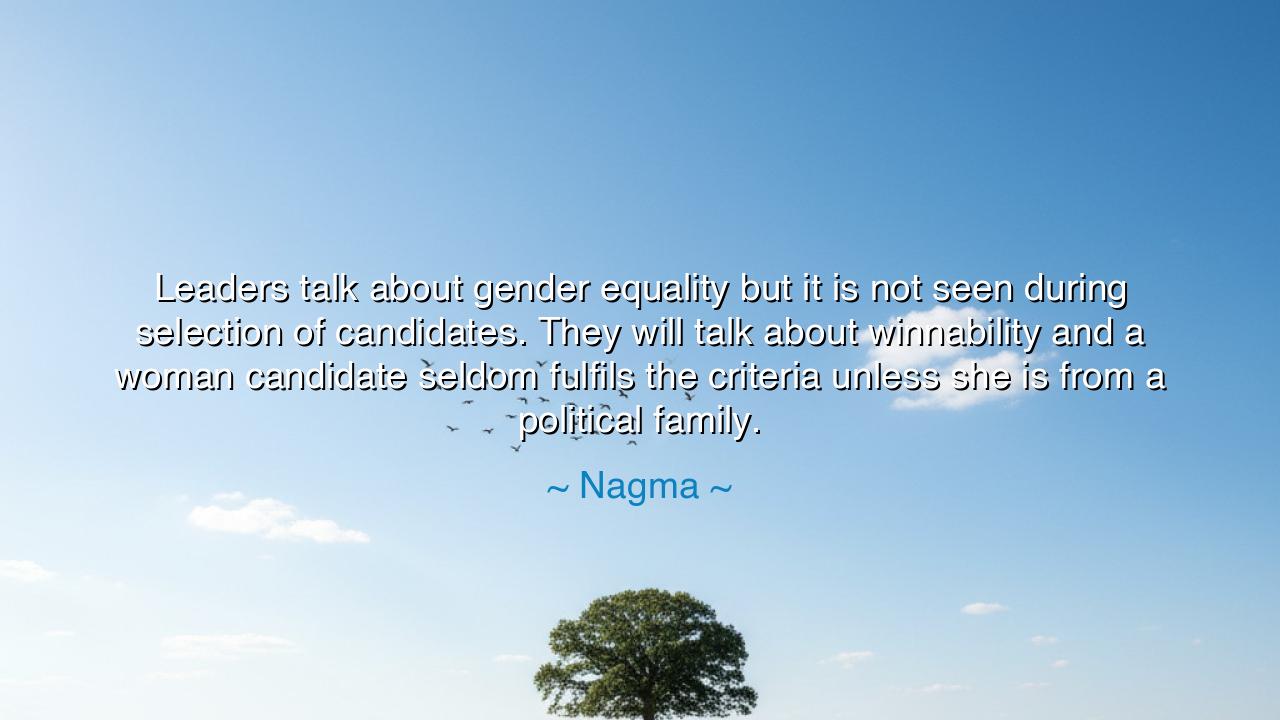
Leaders talk about gender equality but it is not seen during
Leaders talk about gender equality but it is not seen during selection of candidates. They will talk about winnability and a woman candidate seldom fulfils the criteria unless she is from a political family.






In the hallowed halls of power, where decisions are made that shape the future of nations, there exists a striking contradiction that continues to echo through time: the call for gender equality and the reality of its absence in the very mechanisms of leadership. Nagma’s words—“Leaders talk about gender equality but it is not seen during selection of candidates. They will talk about winnability and a woman candidate seldom fulfills the criteria unless she is from a political family.”—resonate deeply, for they touch upon a truth that has been long obscured by the rhetoric of fairness and progress. Gender equality, when examined in the light of political practice, often proves to be a mere illusion—one that is spoken of but rarely acted upon.
The ancients knew well the tension between words and deeds, and the Greek philosophers often spoke of the “gap between the ideal and the real.” Plato, in his "Republic," envisioned a society in which women could hold the same roles as men, but such ideals remained largely unattainable during his time. Even in his envisioned ideal state, women were still seen as secondary figures, confined to roles that reflected the values of the prevailing patriarchal society. Similarly, Nagma's words reflect the modern struggle—leaders may speak of equality, but the structures that govern leadership selection remain steeped in patriarchy, where women, unless born into political families, are systematically excluded from real positions of power.
This tension between idealism and reality has long been present in the world of politics. Consider the story of Queen Elizabeth I of England, a woman who rose to power in an age where women were rarely seen as suitable rulers. Despite being the daughter of the infamous Henry VIII, Elizabeth was forced to navigate a political landscape that consistently undermined her worth due to her gender. Yet, through sheer intellect, determination, and the ability to wield power with unmatched wisdom, she became one of England’s greatest monarchs. Elizabeth’s reign is a testament to the fact that women can lead with strength and vision, but also to the fact that women in politics are often forced to meet more rigorous criteria than their male counterparts—a burden that is acknowledged but seldom addressed.
Indeed, Nagma’s reflection shines a light on a reality that is all too common in politics today. A woman, despite her skills, qualifications, and vision, is often not deemed electable unless she has a lineage of political power behind her. The very nature of winnability—the belief that a candidate’s success hinges not on merit, but on their connections—reinforces the barriers to equality that still exist. In many cases, it is not the candidate’s experience or capability that determines their worth, but their proximity to the elite circles of political power. Thus, the promise of gender equality in political leadership becomes a promise unfulfilled, one that remains out of reach for most women.
Consider the struggle of Indira Gandhi, India’s first and, to this day, only female Prime Minister. Though she became one of the world’s most powerful leaders, her ascent was not without skepticism. She was often seen as the product of family connections rather than a leader in her own right, despite her ability to lead India through some of its most turbulent years. Gandhi’s story is a powerful reminder that even when women reach the highest offices, they are often measured not by their actions but by their relationships. This duality—being both empowered and yet diminished in the eyes of many—illustrates the paradox of gender equality in politics. For many women, the road to leadership is not simply about merit but about navigating a system that undervalues their achievements unless tied to an influential family.
The lesson we draw from Nagma’s words is one that calls us to action. To truly embrace gender equality, we must address not just the language of equality but the very structures that perpetuate inequality. Political systems must change, and the criteria by which candidates are selected must evolve to recognize the merit and vision of all individuals, regardless of gender. Equality is not just about inclusion in conversation—it is about making room for women to step forward, without the burdens of disproportionate scrutiny or the need for inherited power.
So let us take a stand, as citizens, as leaders, as advocates for true equality. Let us support those who break through the barriers of gender-based discrimination, not simply by speaking of their worth but by acting to ensure their voices are heard. Let us demand that the structures of power reflect not the old, patriarchal biases, but the promise of true equality—where the best candidate is chosen not for their family name but for their ability, their vision, and their commitment to the collective good. In this way, the world will finally see a politics that is not defined by the inequality of its past, but by the equality of its future.






AAdministratorAdministrator
Welcome, honored guests. Please leave a comment, we will respond soon